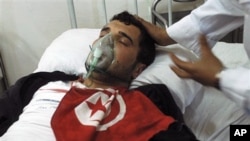The Tunisian government has used brutal methods to quell anti-government protests, according to the international rights group Amnesty International.
Amnesty International’s Middle East North Africa Program Deputy Director Hassiba Hadj Sahraoui says Tunisian doctors have found bullet wounds that show some protesters were shot from behind.
"The evidence we have show that people were killed by single shots to the chest or the head, sometimes at the back of the head, showing clearly that the people were not presenting a threat and this evidence suggests deliberate intent to kill," said Sahraoui.
Amnesty International sent a research team to Tunisia on January 14, the same day now-ousted president Zine el Abidine Ben Ali fled the country. He was forced out by weeks of angry protests, as people rallied against poverty, repression, and corruption.
Amnesty says some protesters acted violently, but the security response was disproportionate. It says tear gas, rubber bullets, and live ammunition were widely used and people were tortured in police custody.
Sahraoui says Tunisia’s security service needs a fundamental overhaul.
"It is a body that has ruled the life of Tunisians for so many years. It is a body that is not accountable to anyone for the moment," said Sahraoui. "And it is really fundamental reform that is needed. Unless the whole mind setting is changed abuses are likely to continue to take place."
Tunisia’s interim government says it will set up an independent commission to investigate human-rights abuses committed during weeks of protests.
Sahraoui says it must be a thorough investigation.
"A commission of inquiry or a Commission that is not able to summon officials, including very high level officials, a commission that is not able to have access to archives to really see what were the instructions that were given or a commission that is simply looking into processes rather than really providing responses to families will not satisfy, at least, the families Amnesty International has met with," Sahraoui said.
The government says 78 people were killed in the violence, the United Nations says it might be closer to 100.
Amnesty’s research team in Tunisia said it met with families of those killed, individuals who were injured, witnesses, lawyers, and doctors.
Amnesty: Tunisian Security Forces Acted Brutally














